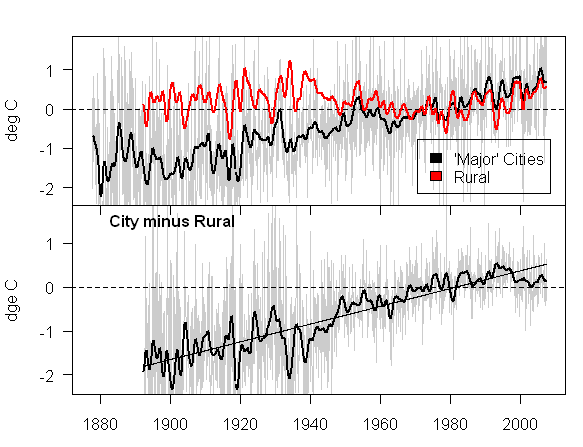This can be a win-win for you if you want to sell the notion of a warming trend. Well, yes I do. And the data indicate a warming trend over the past 150 years, no matter how much you try to confuse the issue and avoid the question.
The data in the paper: later freeze, earlier thaw. Consistent with global warming. No other additional conflations.
Why do you suppose no one has updated this data series? It seems like it would be an easy thing to do.
Well, two things. The data set is highly variable. 12 more years might not add much information to it. Two: did you look at the first link, the authors, and the date? It's a short article; read the whole thing.
Another thing about ice is that it is supposed to create a positive feedback. Ice melts, lowering albedo and causes more melting. But Antarctic ice extents are at a thirty year high in spite of the warming over that period. Could it be that there is also a negative feedback with ice? Sea surface warms, evaporating water that becomes ice in Antarctica, increasing albedo which lowers temperature.
Did I previously provide the link to the paper by a physicist at U. Washington that shows that increasing Antarctic sea ice is a consequence of global warming. Aw, h*ll, this is so much fun I'll do it again. Don't ask me to support this one with analysis; all I can do is take his word for it.
Ach, I forgot, actually there's two of them.
Warmer Air May Cause Increased Antarctic Sea Ice Cover
Here is the information for the second, which is the one to which I was actually referring:
1) Zhang, Jinlun, 2007. Increasing Antarctic Sea Ice under Warming Atmospheric and Oceanic Conditions. Journal of Climate Vol. 20, No 11, pp. 2515–2529, June 2007
Abstract
Estimates of sea ice extent based on satellite observations show an increasing Antarctic sea ice cover from 1979 to 2004 even though in situ observations show a prevailing warming trend in both the atmosphere and the ocean. This riddle is explored here using a global multicategory thickness and enthalpy distribution sea ice model coupled to an ocean model. Forced by the NCEP–NCAR reanalysis data, the model simulates an increase of 0.20 × 1012 m3 yr−1 (1.0% yr−1) in total Antarctic sea ice volume and 0.084 × 1012 m2 yr−1 (0.6% yr−1) in sea ice extent from 1979 to 2004 when the satellite observations show an increase of 0.027 × 1012 m2 yr−1 (0.2% yr−1) in sea ice extent during the same period. The model shows that an increase in surface air temperature and downward longwave radiation results in an increase in the upper-ocean temperature and a decrease in sea ice growth, leading to a decrease in salt rejection from ice, in the upper-ocean salinity, and in the upper-ocean density. The reduced salt rejection and upper-ocean density and the enhanced thermohaline stratification tend to suppress convective overturning, leading to a decrease in the upward ocean heat transport and the ocean heat flux available to melt sea ice. The ice melting from ocean heat flux decreases faster than the ice growth does in the weakly stratified Southern Ocean, leading to an increase in the net ice production and hence an increase in ice mass. This mechanism is the main reason why the Antarctic sea ice has increased in spite of warming conditions both above and below during the period 1979–2004 and the extended period 1948–2004.
Have you noticed that we are getting farther away from the human-caused aspect of the warming trend that is supported (well within past ranges before man’s influence) with each of the denier’s statements.
It is admitted that it isn’t necessary to prove that the current and recent past is warming slightly; what is important to the skeptic is that this is the time for caution, not panic and overreaction.
Rising sea levels over a time frame that outran adaptation by the coastal dwellers could prove to be costly, but so far that isn’t the case.
Sea levels can only rise by melting of trapped land ice or thermal expansion of the sea itself (unless the ground is sinking).
The only loss of ice we have charted remains largely seasonal and has been limited to the northern hemisphere.
While the northern hemispere is much more important to the majority of living creatures it is not the whole globe.
Trying to remove the present carbon-load in the earth’s air would prove to be far more costly and disruptive to industry that any gradual rise in sea levels.
If it were accepted that mankind caused it, we still would have to remember that it took hundreds of years for it to be noticed and get to its current state.
What makes anyone think that we can stop and then reverse the process overnight or even a few generations?
shows that increasing Antarctic sea ice is a consequence of global warming So we used to believe that a runaway positive polar feedback effect was waiting to bite us in the butt and now we discover that the science is not settled. We used to believe that the Sun was a constant, and now we know that it is a huge variable in climate change.
Every few years we are discovering new things that radically alters the picture of things that change the climate. In view of this, maybe we should wait until the science settles down before pressing the panic button.
